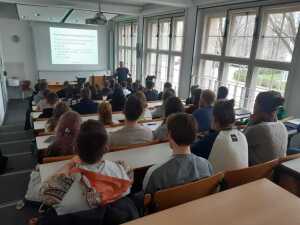Guest talk by A. Mark Williams
Published:
Gastvortrag von A. Mark Williams am 03.04.2023
Image: Rouwen Cañal-BrulandOn 3 April 2023 Prof. Dr. A. Mark Williams (Institute of Human and Machine Cognition, Pensacola, Florida, USA) was a guest in the Department for the Psychology of Human Movement and Sport. Prof. Dr. A. Mark Williams is one of the world's most cited (h index = 109; > 52,000 citations in google scholar) sports scientists and a leading expert in the fields of expertise research, anticipation and decision-making in sport, motor learning, talent identification and development, among others.
The Department for the Psychology of Human Movement and Sport organized an institute-wide guest talk in the lecture hall of the Institute for Sport Science. About 50 students and staff of the Institute followed this invitation. They listened to an exciting and multifaceted talk on the topic of "The best: How elite athletes are made". This offered an insight into the decades of research by Prof. Dr. A. Mark Williams, among others, on the factors influencing the development of expertise in sport as well as on opportunities and challenges in the fields of talent identification and development. A more detailed description of his talk can be found below:
Abstract: Many factors impact the development of expertise in sport. The contribution of hereditary characteristics and the importance of practice, instruction, and the mentorship of significant others are often debated. The common or lay opinion is that elite performers are born rather than made, creating the perception that less ‘gifted’ athletes may continually strive to reach excellence without making the necessary gains needed to compete at the highest level. However, recent research employing the deliberate practice theoretical framework has indicated that athletes achieve excellence in sport through many hours of deliberate, purposeful practice with the specific intention of improving performance. Typically, performers devote more than 10,000 hours of practice to achieve excellence, regardless of sport. This commitment and continual engagement in practice is the most important determining factor on the path to excellence. Hereditary factors may also be important in helping elite athletes develop the necessary ‘rage to master’ (i.e., the commitment and motivation to persist in practice over many years). The proposal is that expertise develops because of specific adaptations to the unique constraints imposed on the athlete during practice and performance. In this paper, an attempt is made to highlight the practice history profiles of elite performers and to illustrate through reference to recent empirical research the type of psychological adaptations that arise because of extended involvement in sport. A particular focus will be on the development of perceptual-cognitive skills such as anticipation and decision making in fast, ball sports such as tennis and soccer. Practical implications for talent identification and development are highlighted, with attempts to illustrate the nature and type of practice activities most likely to help nurture future generations of elite performers in sport.
